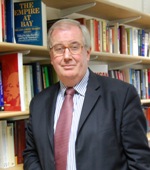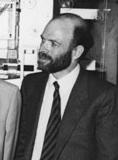Related Research Articles

The London School of Economics is a public research university located in London, England, and a member institution of the federal University of London. Founded in 1895 by Fabian Society members Sidney Webb, Beatrice Webb, Graham Wallas, and George Bernard Shaw for the betterment of society, LSE joined the University of London in 1900 and established its first degree courses under the auspices of the university in 1901. LSE started awarding its own degrees in its own name in 2008, prior to which it awarded degrees of the University of London.
The Hoover Institution on War, Revolution, and Peace is an American public policy think tank and research institution located at Stanford University in California. It began as a library founded in 1919 by Stanford alumnus Herbert Hoover, before he became President of the United States. The library, known as the Hoover Institution Library and Archives, houses multiple archives related to Hoover, World War I, World War II, and other world history. According to the 2016 Global Go To Think Tank Index Report, Hoover is No. 18 in the "Top Think Tanks in the United States".
United States Objectives and Programs for National Security, better known as NSC 68, was a 66-page top secret National Security Council (NSC) policy paper drafted by the Department of State and Department of Defense and presented to President Harry S. Truman on 7 April 1950. It was one of the most important American policy statements of the Cold War. In the words of scholar Ernest R. May, NSC 68 "provided the blueprint for the militarization of the Cold War from 1950 to the collapse of the Soviet Union at the beginning of the 1990s." NSC 68 and its subsequent amplifications advocated a large expansion in the military budget of the United States, the development of a hydrogen bomb, and increased military aid to allies of the United States. It made the rollback of global Communist expansion a high priority. NSC 68 rejected the alternative policies of friendly détente and containment of the Soviet Union.

Alan Sked is a British academic and politician. He is Professor Emeritus of International History at the London School of Economics, founded the party now known as the UK Independence Party and has stood as a candidate in several parliamentary elections.
Sir Charles Kingsley Webster was a Cambridge-trained historian and British diplomat. He was educated at King's College, Cambridge as well as the Merchant Taylors' School, Crosby. After leaving Cambridge University, he went on to become a professor at Harvard, Oxford, and the London School of Economics. He also served as President of the British Academy from 1950 to 1954.
The Royal Economic Society (RES) is a professional association that promotes the study of economic science in academia, government service, banking, industry, and public affairs. Originally established in 1890 as the British Economic Association, it was incorporated by royal charter on December 2, 1902. The society is a charity registered with the U.K. Charity Commission under charity number 231508.
Simon Frederick Peter Halliday was an Irish writer and academic specialising in International Relations and the Middle East, with particular reference to the Cold War, Iran, and the Arabian peninsula.
Craig Jackson Calhoun is an American sociologist, currently University Professor of Social Sciences at Arizona State University. An advocate of using social science to address issues of public concern, he was the Director of the London School of Economics and Political Science from September 2012 until September 2016, after which he became the first president of the Berggruen Institute. Prior to leading LSE, Calhoun led the Social Science Research Council, and was University Professor of the Social Sciences at New York University and Director of NYU's Institute for Public Knowledge. With Richard Sennett he co-founded NYLON, an interdisciplinary working seminar for graduate students in New York and London who bring ethnographic and historical research to bear on politics, culture, and society.

Odd Arne Westad FBA is a Norwegian historian specializing in the Cold War and contemporary East Asian history. He is the Elihu Professor of History and Global Affairs at Yale University, where he teaches in the Yale History Department and in the Jackson Institute of Global Affairs. Previously, Westad held the S.T. Lee Chair of US-Asia Relations at Harvard University, teaching in the John F. Kennedy School of Government. Westad has also taught at LSE, where he served as director of LSE IDEAS. In the spring semester 2019 Westad was Boeing Company Chair in International Relations at Schwarzman College, Tsinghua University.

Michael E. Cox is a British academic and international relations scholar. He is currently Emeritus Professor of International Relations at the London School of Economics (LSE) and Director of LSE IDEAS. He also teaches for the TRIUM Global Executive MBA Program, an alliance of NYU Stern and the London School of Economics and HEC School of Management.
Sir Timothy John Besley, is a British academic economist who is School Professor of Economics and Political Science and Sir W. Arthur Lewis Professor of Development Economics at the London School of Economics. He is also a two-year fellow at All Souls College, Oxford. Since 2015, he has been a commissioner on the National Infrastructure Commission.

Nicholas Barr FRSA is a British economist, currently serving as professor of public economics at the London School of Economics (LSE). He received his Ph.D. in economics as a Fulbright Scholar from the University of California, Berkeley and his MSc in economics from LSE. According to his LSE biography, he has worked for the World Bank, "from 1990 to 1992 working on the design of income transfers and health finance in Central and Eastern Europe and Russia, and in 1995–96 as a principal author of the World Bank's World Development Report 1996: From Plan to Market." He also served as an advisor to the British, Chinese and South African governments.
MacGregor Knox is an American historian of 20th-century Europe, and was from 1994 to 2010 the Stevenson Professor of International History at the London School of Economics. He is the son of the British-born classical scholar and historian Bernard Knox and the novelist Bianca VanOrden.
LSE IDEAS is a foreign policy think tank at the London School of Economics and Political Science. IDEAS was founded as a think tank for Diplomacy and Strategy in February 2008, succeeding the Cold War Studies Centre founded in 2004. Its Directors are Professor Christopher Coker and Professor Michael Cox.
Jussi M. Hanhimäki is a Finnish historian, specializing in the history of the Cold War, American foreign policy, transatlantic relations, international organizations and refugees.
Effie G. H. Pedaliu is an international historian, author and Visiting Fellow at LSE IDEAS. She has held posts at LSE, KCL and UWE. She is the author of Britain, Italy and the Origins of the Cold War,, the co-editor of Britain in Global Affairs, Volume II, From Churchill to Blair, and The Foreign Office, Commerce and British Foreign Policy in the 20th Century.
Zachary Daniel Kaufman is a legal academic and social entrepreneur.

Robin Burgess, is a Professor of Economics, the Director of the Economic Organisation and Public Policy Programme, Co-founder and Director of the International Growth Centre, and Co-Director of the Suntory and Toyota International Centres for Economics and Related Disciplines (STICERD) at the London School of Economics and Political Science.
Nancy Snow is an American professor and scholar of propaganda and public diplomacy. She has authored, edited or co-edited thirteen books, including Propaganda, Inc.: Selling America's Culture to the World, an overview of American cultural policy that includes a foreword by Herbert Schiller and introduction by Michael Parenti; and Information War: American Propaganda, Free Speech and Opinion Control since 9-11. Snow is Emerita Professor of Communications at California State University, Fullerton.